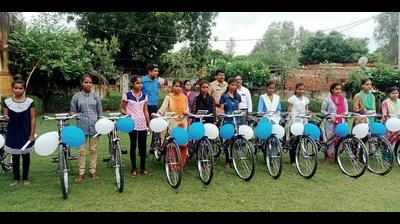- News
- City News
- lucknow News
- Cycle of change: Pedal power for girl education in Barabanki village
Trending
This story is from July 13, 2019
Cycle of change: Pedal power for girl education in Barabanki village
Every year, a little over 5 lakh girls in Uttar Pradesh leave school and take up household chores. Girls from Barabanki’s Chandrawa village would have become part of that statistic this year but an opportunity for further studies came on wheels for them.

Every year, a little over 5 lakh girls in Uttar Pradesh leave school and take up household chores. Girls from Barabanki’s Chandrawa village would have become part of that statistic this year but an opportunity for further studies came on wheels for them.
LUCKNOW: Every year, a little over 5 lakh girls in Uttar Pradesh leave school and take up household chores. Girls from Barabanki’s Chandrawa village would have become part of that statistic this year but an opportunity for further studies came on wheels for them.
Deepmala, 10, would have met the fate of her elder sister had it not been for Kishori Cycle Bank started by village head Prakashini Jaiswal.
“Without this, I would have got married in a few months. The moment girls quit school, the families start looking for a suitable match for them,” said the young girl.
Like Deepmala, all eligible girls in the village took admission to secondary school in the academic session that began on July 1 in what was a shift from previous years. This was because of a “cycle bank” that was started by Prakashini, who champions the cause of girls’ education.
“Girls who had a cycle were taking admission to the secondary school because that assured parents. However, those who did not were left behind. Because not all families could afford it, we thought of starting a cycle bank,” stated the progressive village head.
The ‘bank’ started with 15 cycles parked at Prakashini’s home. These were bought by the gram panchayat, donated by social organisations and even by villagers themselves. The cycles, now 25 in number, are used by the girls as needed and returned to the panchayat.
The move led to immense success and appreciated on many fronts. Calling it a practical and effective tool for girl child empowerment, social policy specialist at Unicef Piush Antony said that the move will have a lasting effect on the life of these girls. “The girls will be saved from teenage marriage. Higher education will also improve quality of life,” she said, adding it was a model worth emulation.
Deepmala, 10, would have met the fate of her elder sister had it not been for Kishori Cycle Bank started by village head Prakashini Jaiswal.
“Without this, I would have got married in a few months. The moment girls quit school, the families start looking for a suitable match for them,” said the young girl.
Like Deepmala, all eligible girls in the village took admission to secondary school in the academic session that began on July 1 in what was a shift from previous years. This was because of a “cycle bank” that was started by Prakashini, who champions the cause of girls’ education.
“In my village, many girls could not go to school beyond class 8 as the secondary school was over 6km away from the village, which deterred parents,” she said. “Distance, cost of travel, lack of public transport and safety issues were their worries. But, everyone agreed to send girls to school if it was nearby,” recalled Prakashini. While starting a new school was not easy, Prakashini thought of an alternative.
“Girls who had a cycle were taking admission to the secondary school because that assured parents. However, those who did not were left behind. Because not all families could afford it, we thought of starting a cycle bank,” stated the progressive village head.
The ‘bank’ started with 15 cycles parked at Prakashini’s home. These were bought by the gram panchayat, donated by social organisations and even by villagers themselves. The cycles, now 25 in number, are used by the girls as needed and returned to the panchayat.
The move led to immense success and appreciated on many fronts. Calling it a practical and effective tool for girl child empowerment, social policy specialist at Unicef Piush Antony said that the move will have a lasting effect on the life of these girls. “The girls will be saved from teenage marriage. Higher education will also improve quality of life,” she said, adding it was a model worth emulation.
End of Article
FOLLOW US ON SOCIAL MEDIA











